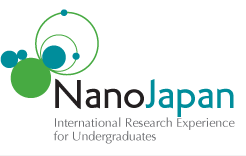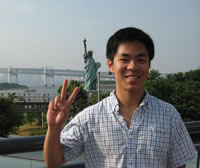


NanoJapan Research Overview
I loved the experience of doing research abroad. The experience was eye-opening because of the interactions with the mentors and advisors where so unique. It was not as if we spoke the same language very well, so we had to adapt explanations and learning. From this summer I will take away a more open attitude towards learning and a greater understanding not only in research but in general interactions with other people.
My research project helped me decide that I would stick with electrical engineering, however, I am not sure if I want will like signals or applied physics specialization more and I will decide after taking classes this upcoming academic year. This internship has motivated me to further seek out graduate school plans with a goal of obataining a master's and possibly a PhD.
Meaning of NanoJapan
For me, the NanoJapan program combined two wonderful things I was looking for this summer: a research internship and an opportunity to go abroad. I had never done such a long research internship, although I have had previous research experiences, and it was certainly worth it. Honestly, I was not specifically looking at going abroad to Japan, but Japan was definitely a prospective country for me because of its unique culture and the great opportunities to see things and experience all sorts of foods and events there.
This program is very important because it gives young undergraduates a chance to gain a new perspective on life and research as well. Engineering and physics students from the United States do not have many opportunities for these experiences abroad which are valuable life experiences and they should not be penalized for picking these difficult majors yet be given limited opportunities. I chose to participate in this program because it was exactly what I was looking for and I believe this relates to my undergraduate education not only because I was able to learn more about physics and engineering but also take new approaches to learning and a more open attitude towards new things. I am definitely going to continue looking for international opportunities not only for research but for anything else such as service or culinary exploration.
Daily Life in Japan
Basically a weekday while I was in Sapporo consisted of work in the lab from late monring until about 5:30 pm. During the first few weeks I worked closely with my graduate student mentor in the lab but afterwards I would often just be working on my own on the MBE or taking measurements, or summarizing data. In the first few weeks, I ate lunch in the cafeteria with other labmates, but after a while I found it extremely cost-effective to bring my lunch everyday. I would always try to get all of my computer, internet and email things done during the day so in the evening I could focus on other things.After work, I would usually relax in my room and then cook dinner for about an hour usually with Amal and then eat. Afterwards, I would study Japanese, go to the gym, or read an English book I found.
So in summary, I was often alone or hanging out with other NanoJapan students in Sapporo. On occasion, I was able to hang out with some Japanese students I knew through other people or some of the international students in our dormitory, but most time was spent with other NanoJapan students. On weekends, we would travel around Hokkaido or at least Sapporo.
One of the biggest challenges I faced everyday was keeping busy and not simply slinking into bed after being drained by long hours at lab. Particularly rewarding was cooking for me, because I do not usually cook and so I was able to learn a lot and it was interesting to cook food with Japanese ingredients I was unfamiliar with such as soba noodles, which we abused by using them in all sorts of dishes.
My favorite experience in Japan was...
My favorite experience in Japan was coming down from Mt. Fuji. The long and miserable hike up with the cold and the rain gave me a terrible headache and I had altitude sickness. At one or two points I was seriously considering turning around and going back down regardless of the immense path needed to be covered or the simple fact there were tons of other people all crowded in lines in front and behind me. Going down, the weather cleared up and I was able to lose my headache and nausea since I rested for about two hours at the top. The view was incredible, and here I was with a few of my good NanoJapan friends going down these incredible sliding paths filled with rocks and a great view in front of us. It was extremely rewarding. I finally understood why most Japanese at least try to climb Mt. Fuji at least once in their lifetime. I also understand why most do not ever climb it again.
While I was in Japan I wish I had...
While I was in Japan I wish I had became closer friends with more Japanese students. It was hard for me because I worked alone in my laboratory usually and the other students in my lab were quite busy with their research and studies. I believe that being able to hang out and converse more with other Japanese students even outside my lab would not only have improved my Japanese significantly but also have allowed me to better understand what their culture was like at least for young adults.